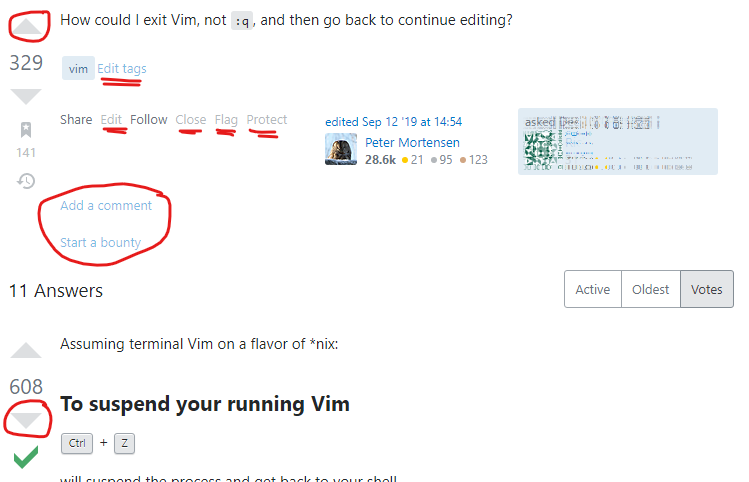About
The main purpose of this script is to prevent one from accidentally interacting with questions/answers posted by a sock of their own (but it can also be used to avoid interacting with posts from other users, not necessarily sockpuppet accounts).
This is useful if you post questions/answers from a sockpuppet and use your main account to view them. You might not pay attention to the fact that you're using the main account and accidentally interact with the post (e.g., vote on answers by others, leave comments, etc.). It works as follows:
If the post is a question, it disables:
- Vote buttons (up and down) on the question and all answers.
Flagbuttons on the question and all answers.- The
Closebutton. - The
Protect/Unprotectbutton. - The
Start a bountylink. - The Post Your Answer button
- The
Editlink on the question and all answers. - The
Add a commentlink on the question and all answers.
If the post is an answer, it disables:
- Vote buttons (up and down) on the answer only.
- The
Flagbutton on the answer only. - The
Editlink on the answer only. - The
Add a commentlink on the answer only.
Screenshot:
Platform:
Tested on Chrome and Firefox using Tampermonkey but should probably work with any modern browser with JavaScript enabled.
Code:
// ==UserScript==
// @name SE: Don't let me interact with this user's posts
// @version 1.2
// @namespace https://stackapps.com/users/80115/41686d6564
// @description This scripts disables interactions with posts by certain users (avoid accidentally interacting with your own sockpuppet)
// @author https://stackapps.com/users/80115/41686d6564
// @match *://stackoverflow.com/questions/*
// @match *://meta.stackoverflow.com/questions/*
// ==/UserScript==
// Add user IDs here
var usersToAvoid = ['userId1', 'userId2'];
$(window).on('load', function() {
"use strict";
let question = $('#question');
if (question.length == 0)
return;
if (!checkPost(question, true)) {
$('#answers').children('div.answer').each(function() {
let answer = $(this);
checkPost(answer, false);
});
}
});
function checkPost(post, isQuestion) {
let ownerUserDetails = post.find('div.user-details[itemprop="author"]');
if (ownerUserDetails == 0)
return false;
let url = ownerUserDetails.find('a')[0].getAttribute("href");
let userId = url.match(/^\/users\/(\d+)/)[1];
if (usersToAvoid.includes(userId)) {
let scope = isQuestion ? post.parent() : post;
scope.find('button.js-vote-up-btn').prop("disabled", true);
scope.find('button.js-vote-down-btn').prop("disabled", true);
scope.find('button.js-flag-post-link').prop("disabled", true);
replaceLinkWithDisabledButton(scope.find('a.js-edit-post'), 'js-edit-post');
replaceLinkWithDisabledButton(scope.find('a.js-add-link.comments-link'), 'js-add-link.comments-link');
if (isQuestion) {
$('button.js-close-question-link').prop("disabled", true);
scope.find('button[id=btnProtectLoggedIn]').prop("disabled", true);
scope.find('button[id=btnUnprotectLoggedIn]').prop("disabled", true);
replaceLinkWithDisabledButton($('a[id=edit-tags]'), '');
replaceLinkWithDisabledButton(scope.find('a.js-suggest-edit-post'), 'js-suggest-edit-post');
replaceLinkWithDisabledButton($('a.bounty-link'), 'bounty-link');
$('button[id=submit-button]').prop("disabled", true);
}
return true;
}
return false;
}
function replaceLinkWithDisabledButton(link, _class) {
link.replaceWith(function() {
return `<button type="button" class="${_class} s-btn s-btn__link" disabled="">${$(this).text()}</button>`;
});
}
Note: This version supports only one site and its meta (default is Stack Overflow). I wrote another version that works with all sites but I posted it separately as an answer because it needs to make an API call upon visiting any /questions/* page. If you only want to support one site, use this version instead because it'll be faster.
If you have any suggestions, please leave them below.

